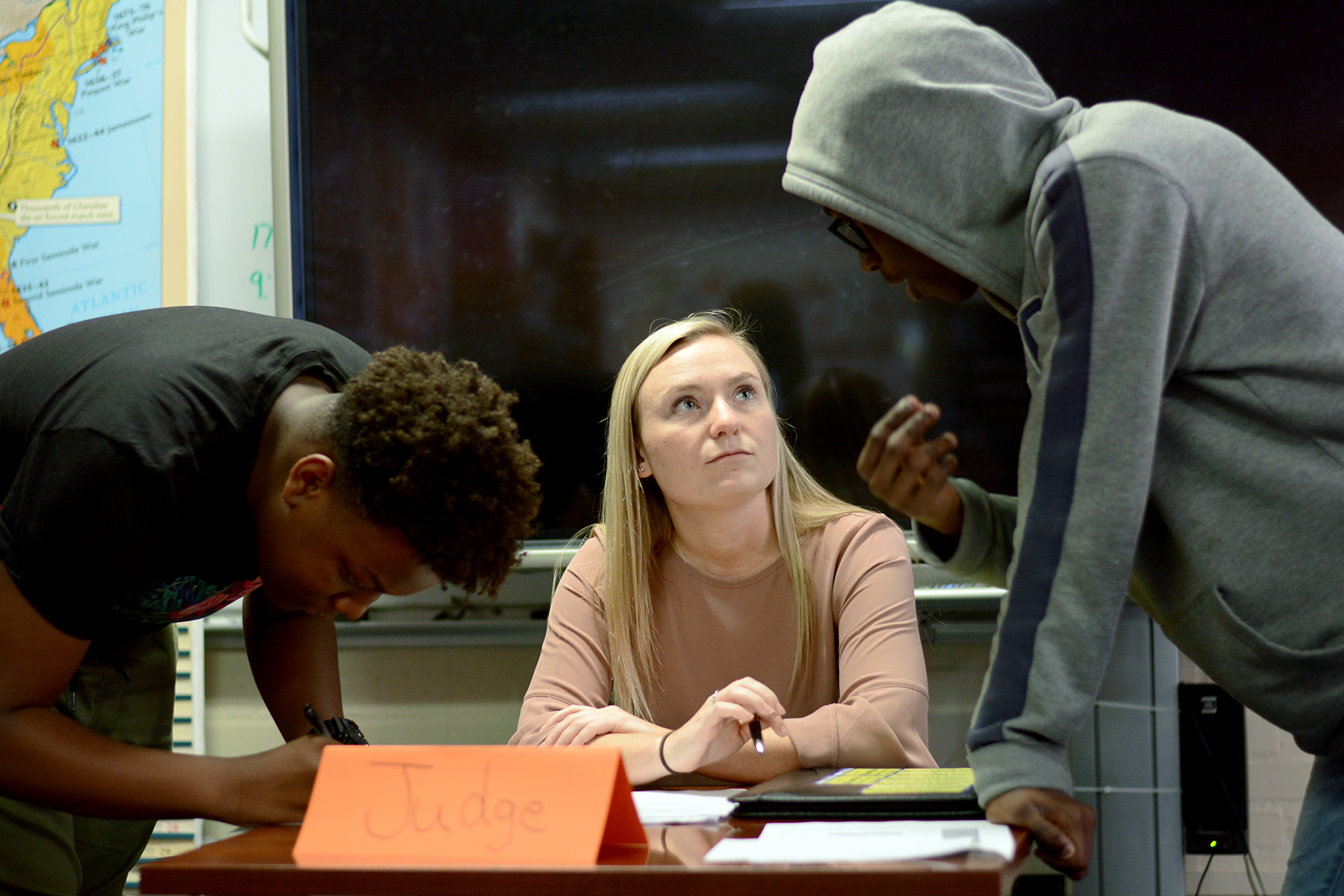A fall trimester course provided Elon Law students with an opportunity to visit local high schools and a juvenile detention center to teach teenagers about the constitutional rights afforded them in the justice system.
Fifteen Elon Law students took part in a fall trimester course that assigned them to inspire and educate young people about the constitutional rights afforded those who find themselves enmeshed in the justice system.
Student teams involved in a reconstituted “Street Law” course led by faculty members Steve Friedland and Marissa Meredith had the flexibility to craft their own lesson plans during weekly visits to Greensboro high schools.

Some shared best practices for interacting with law enforcement, while others organized mock trials where students played the roles of prosecutors, defense attorneys, and jurors.
The Elon Law students connected with upward of 150 teenagers across the city, including students at the STEM Early College at N.C. A&T, the Greensboro College Middle College, Dudley High School, Grimsley High School, and the Guilford County Juvenile Detention Center.
Elon Law relaunched its “Street Law” course after a two-year hiatus. It was last offered before Larry D. Brown, Jr., a former Elon Law adjunct professor, was appointed judge in Alamance County. Brown’s move to the bench in 2017 kept him from continuing the program, which had been offered for nearly a decade.
“It’s about reaching out into the community and helping others understand the law,” said Friedland, Elon Law’s senior scholar and a member of the Greensboro Criminal Justice Advisory Commission. “It’s really about access and education, collaboration and communication. If we can check these boxes, our program is a success.”

The “Street Law” course also afforded Elon Law students time to learn from young people how many teenagers view the justice system and what influences their choices and behavior, for better or worse. Peer pressure. Family dynamics. Wellness and health. In some instances, economic and food insecurity.
“This is what the students they’re teaching are dealing with,” Meredith said. “To be great lawyers, you need to be educated on the issues and understand that our own backgrounds shape our views, and the same is true for your clients.”
James Harris L’19 and Eboni Gunn L’19 teamed together to educate teenagers inside the Guilford County Detention Center about the law and the criminal justice system. On their final visit to the center in November, the duo sought to empower the teens to learn from their experiences, then advocate for change.
“You all have a unique perspective that others don’t have,” Harris said. “Mass incarceration is a real thing and it affects so much of what we see.”
Additional Elon Law student reflections
Max Baker L’20
Undergraduate studies: Ferrum College (political science)
Street Law assignment: Dudley High School
Intended Practice Area: U.S. Navy JAG Corps or criminal defense
“On more than one occasion, we broke from the lesson plan and just talked to the class about things like getting into college, interacting with police, recognizing implicit bias, and the importance of understanding that grades do not define a student. I don’t think these talks would have been possible if we had not taken the time to relate to each of the students. In all, these students left me with no doubt that they possess the ability to be wildly successful in anything they do. Be it charisma, quickness of thinking, strong morals, or humor, each student has something unique and special.”

Madison Guttry L’20
Undergraduate studies: California State University Monterey Bay (business administration)
Street Law assignment: STEM Early College at N.C. A&T
Intended practice area: Criminal prosecution
“Teaching at STEM Early College was an incredible experience and such a rewarding opportunity. I truly enjoyed giving back to the community and teaching my students about the law. The most rewarding part was watching my students participate in a mock trial at the end of our course. The school, teacher, and students were all thrilled that Elon Law was willing to share the knowledge and information with them.”

Alexa Litt L’19
Undergraduate studies: UNC Charlotte (criminal justice)
Street Law assignment: Guilford County Juvenile Detention Center
Intended practice area: Family law/criminal law
“The experience I gained through Street Law was invaluable and I enjoyed having the opportunity to be a constant in the lives of the young men incarcerated who are constantly worrying about their futures. It was clear to me how excited they were each week to spend some time learning and engaging themselves in the activities we planned, and to see their growth from week to week as they performed in their last mock trial applying evidentiary objections and trial techniques that new attorneys still struggle with. I know they will all have bright futures despite their difficult pasts.”
Kelli Rawlinson L’19
Undergraduate studies: UNC Greensboro (political science & philosophy)
Street Law assignment: Guilford County Juvenile Detention Center
Intended practice area: Transactional law
“While at the GCJDC, one of the young men we worked with graduated with his high school diploma. Even though I wasn’t able to attend, it made me so proud. This young man was our most mature, engaged and knowledgeable student from the very first day there. He taught me a lot – probably more than I taught him. But something that I hope I left with him is that he can go on to get other degrees and I was proud of his academic accomplishments thus far and to me, his criminal background before that meant nothing.”



